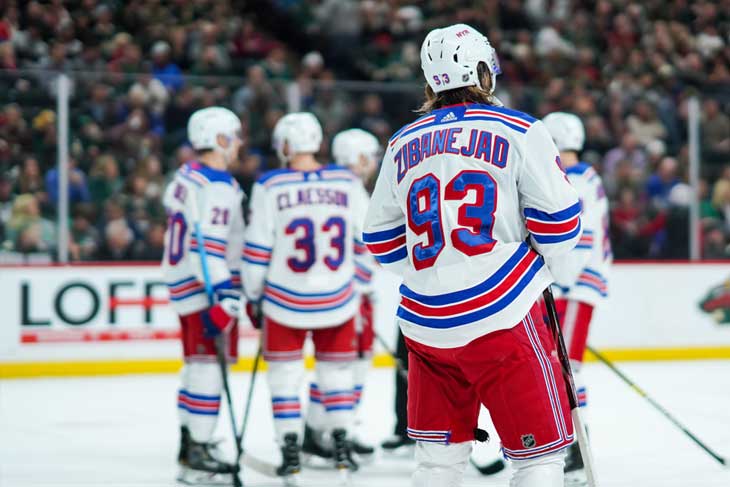2018-19 Season Review: New York Rangers
In many ways, 2018-19 felt like a season defined by coaching. Barry Trotz, Bill Peters, Jim Montgomery and Rod Brind’Amour made headlines by guiding their new clubs to the playoffs, whereas Craig Berube pulled off a jaw-dropping turnaround to finally deliver St. Louis a taste of championship glory.
We were offered crystal-clear evidence of how crucial it is for teams to tailor their system to their players and for their players to buy into the overarching philosophy.
David Quinn didn’t quite reach those heights in his first year with the New York Rangers, but it still felt like a step in the right direction. Despite a 32-36-14 record, he got the most out of a dismal roster and brought a sense of accountability and positive energy back into the organization. The players seemingly enjoyed suiting up for him knowing that this was a meritocracy: You’ll play as much as you deserve. No favoritism. That’s as fair as it gets.
Of course, this didn’t mitigate the fact that New York was outgunned virtually every night. It ranked 24th offensively and 23rd defensively. At 5-on-5, it controlled 46.1% of the shot attempts (30th), 46.0% of the scoring chances (28th) and 47.2% of the high-danger bids (23rd) for an expected goal share of 47.5% (26th). The Rangers weren’t effective in possession or in the trenches and they didn’t boast the type of talent that could compensate for those shortcomings. For the most part, however, they competed hard. By season’s end, 42 of the club’s games had been decided by a single goal. That’s an impressive result from a mediocre cast of characters.
Quinn’s top guns heard his message and welcomed the challenge of setting the tone for their squad. Mika Zibanejad (74 points in 82 games), Chris Kreider (52 points in 79 games) and Mats Zuccarello (37 points in 46 games) led the charge and enjoyed stellar years up front. They aren’t elite forwards, but they combined their skill with a tireless work ethic. That was especially valuable for Zibanejad, who had shown occasional glimpses of star potential since the Ottawa Senators drafted him sixth overall in 2011. Quinn got through to the 26-year-old and summoned a dialed-in Zibanejad. In 2018-19, he exceeded his previous career high by 23 points while cutting down on the listlessness that would sometimes creep into his game. As a result, he hopped into the driver’s seat and carried his line’s offense with a 78.0 individual points percentage. He had never come close to mark prior.
Kreider and Zuccarello were also at the forefront of the attack. The former deployed his world-class speed to great effect in transition, whereas the latter’s craftiness and guts allowed his unit to own 53.8% of the high-danger chances. Though undersized, the 31-year-old winger is a bundle of energy who won’t back down from anyone.
That fiery nature was contagious and trickled down the lineup, as Kevin Hayes (42 points in 51 games), Pavel Buchnevich (38 points in 64 games), Ryan Strome (33 points in 63 games) and rookie Brett Howden (23 points in 66 games) had strong campaigns as well. Granted, Hayes was likely motivated by his impending free agency, as his production rocketed to a new level. Nevertheless, the forward corps as a whole was willing to dig its heels in and make opponents work for their opportunities.
Unfortunately, the picture was much uglier on the back end. Brady Skjei couldn’t hold his own against the opposition’s best in the No. 1 role, conceding far too many chances for comfort. Meanwhile, veterans Marc Staal and Kevin Shattenkirk just weren’t delivering the goods. The Rangers would simply shell up and pray for the best when Staal was on the ice, while Shattenkirk was the team’s best blueliner in possession…but there was little production to show for it (28 points in 73 games) and his defense was so poor that Quinn even resorted to scratching him. Seeing as both players carried hefty cap hits, this was not an ideal situation.
On a brighter note, stay-at-home rearguard Adam McQuaid and 23-year-old puck-mover Tony DeAngelo fared quite well under Quinn. McQuaid is a no-nonsense defenseman who excels at clearing the slot and leaning on forwards in the dirty areas. DeAngelo, for his part, is developing into a wonderful reclamation project for New York. The former Tampa Bay Lightning first-rounder has moved on from any character issues that plagued his past and refined his all-around game to the point where he finished above the team average in SCF%, HDCF% and xGF%.
Between the pipes, Henrik Lundqvist (3.07 GAA, 90.7 SV%) and Alexander Georgiev (2.91 GAA, 91.4 SV%) performed decently. Outside of a brilliant month of November (2.46 GAA, 92.4 SV%), the 37-year-old struggled with consistency. 23-year-old Georgiev was better and inspires hope for the future, but his efforts weren’t enough to shore up a leaky defense. They ultimately registered the 16th-ranked on-ice SV%.
As the trade deadline loomed closer, the Rangers decided to sell off some assets. Zuccarello, Hayes and McQuaid were dealt to contenders in exchange for a bounty of draft picks and prospects. Naturally, this hurt the team in the short term, resulting in a 5-10-6 slide to close out the season. The Rangers put themselves in an awkward position, though, because they were still within striking distance of the postseason bubble prior to the deadline. That slump pushed them down the standings, but it arrived so late that they finished 26th in the league. The Ottawa Senators, Los Angeles Kings and New Jersey Devils had packed it in well before New York made its choice to play the long game.
Then the draft lottery once again proved how cruel or generous it can be. The Rangers leapfrogged their competition to nab the second overall pick and kick-started their rebuild with well-rounded forward Kaapo Kakko.
🇫🇮’s Kaapo Kakko powers down the right side and scores a beauty from the goal line for his 6th goal of the #IIHFWorlds! pic.twitter.com/rx6KxdneDZ
— TSN (@TSN_Sports) May 16, 2019
Selecting a pro-ready blue chip prospect fit the team’s vision of an accelerated winning timeline. Only a few days earlier, it had acquired top-pairing blueliner Jacob Trouba for Neal Pionk and a first-rounder. Adding a 25-year-old defenseman of that caliber was a huge move for the Rangers, who were in desperate need of stability on the back end. Trouba isn’t flashy, but he skates well for his size, can shoot the puck and most importantly, is a nasty piece of business in the trenches. New York couldn’t ice a stud to match up against the Metropolitan Division’s star forwards last season, so Trouba will undoubtedly make life easier for Skjei and the team’s goaltenders.
On the first day of free agency, general manager Jeff Gorton took it one step further. He sent underachieving forward Jimmy Vesey (35 points in 81 games) to Buffalo in order to make room for the single best free agent on the market: Artemi Panarin (87 points in 79 games). $11.6 million per year is tough for any team to swallow, but the Rangers were willing to pay the price for both his talent and the credibility he instantly provides them with. The 27-year-old utterly carried Columbus’ top line last season, pairing his great patience with touch, vision and creativity.
This should make things interesting …#nyc #rangers #NYRangers pic.twitter.com/cLjPeVaWLb
— Pucky (@puckyonline) July 3, 2019
There’s another Russian looking to make a good impression too. 2018 ninth overall pick Vitali Kravtsov boasts an intriguing blend of size (6’3”, 183 lbs), speed and skill. He handles the puck well in space and isn’t afraid of driving to the net to create his own chances. The winger may not be ready for a top-six role yet, but his presence tenders Quinn more options for his forward lines.
Along the blue line, college star Adam Fox is ready to bolster the right side after the team bought out Shattenkirk’s contract. While the 21-year-old’s physical gifts are limited, his smarts, poise and playmaking have arrived at the perfect time for the Rangers. If he’s given power play minutes, he might even produce enough to vie for the Calder Trophy.
We can’t forget about the incumbent youngsters either. Howden, Filip Chytil (23 points in 75 games), Brendan Lemieux (6 points in 19 games) and Libor Hajek (1 point in 5 games) all displayed signs of promise and will provide stiff competition for roster spots.
Last season, Quinn was without question the team’s silver lining. He accomplished much more than anyone expected with his group. Now a gift from the draft gods and Gorton’s assertiveness have drastically expedited the rebuild and altered New York’s outlook. It signed a legitimate, game-changing star, the defense has been buffed and the Rangers have more up-and-comers than they know what to do with. That’s a tricky scenario, though: How heavily will Quinn lean on his rookies? How hard will he push for the playoffs? If they once again find themselves in the conversation near the trade deadline, will they buy, sell or stand pat?
There are question marks written all over the Rangers’ upcoming campaign, but considering where they were only a year ago, that’s…really exciting.
Recent Posts

How Corey Perry Is Making His Presence Felt With the Lightning
View Post »
How Adam Fox Pushed the Rangers Past the Penguins
View Post »

 PHI
PHI PIT
PIT TOR
TOR MTL
MTL TBL
TBL CHI
CHI EDM
EDM VAN
VAN COL
COL STL
STL BUF
BUF WSH
WSH NJD
NJD BOS
BOS NYR
NYR NYI
NYI DET
DET CAR
CAR NSH
NSH CBJ
CBJ WPJ
WPJ CGY
CGY ARI
ARI SJS
SJS VGK
VGK ANA
ANA LAK
LAK MIN
MIN OTT
OTT FLO
FLO DAL
DAL